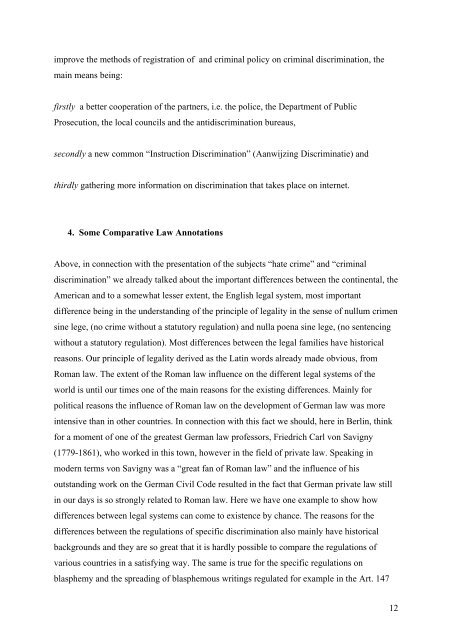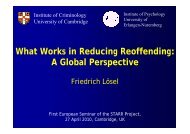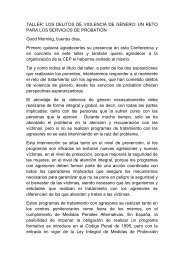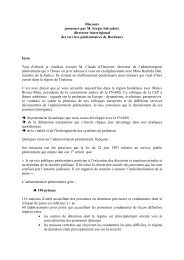Monitoring Hate Crime - CEP, the European Organisation for ...
Monitoring Hate Crime - CEP, the European Organisation for ...
Monitoring Hate Crime - CEP, the European Organisation for ...
Create successful ePaper yourself
Turn your PDF publications into a flip-book with our unique Google optimized e-Paper software.
improve <strong>the</strong> methods of registration of and criminal policy on criminal discrimination, <strong>the</strong><br />
main means being:<br />
firstly a better cooperation of <strong>the</strong> partners, i.e. <strong>the</strong> police, <strong>the</strong> Department of Public<br />
Prosecution, <strong>the</strong> local councils and <strong>the</strong> antidiscrimination bureaus,<br />
secondly a new common “Instruction Discrimination” (Aanwijzing Discriminatie) and<br />
thirdly ga<strong>the</strong>ring more in<strong>for</strong>mation on discrimination that takes place on internet.<br />
4. Some Comparative Law Annotations<br />
Above, in connection with <strong>the</strong> presentation of <strong>the</strong> subjects “hate crime” and “criminal<br />
discrimination” we already talked about <strong>the</strong> important differences between <strong>the</strong> continental, <strong>the</strong><br />
American and to a somewhat lesser extent, <strong>the</strong> English legal system, most important<br />
difference being in <strong>the</strong> understanding of <strong>the</strong> principle of legality in <strong>the</strong> sense of nullum crimen<br />
sine lege, (no crime without a statutory regulation) and nulla poena sine lege, (no sentencing<br />
without a statutory regulation). Most differences between <strong>the</strong> legal families have historical<br />
reasons. Our principle of legality derived as <strong>the</strong> Latin words already made obvious, from<br />
Roman law. The extent of <strong>the</strong> Roman law influence on <strong>the</strong> different legal systems of <strong>the</strong><br />
world is until our times one of <strong>the</strong> main reasons <strong>for</strong> <strong>the</strong> existing differences. Mainly <strong>for</strong><br />
political reasons <strong>the</strong> influence of Roman law on <strong>the</strong> development of German law was more<br />
intensive than in o<strong>the</strong>r countries. In connection with this fact we should, here in Berlin, think<br />
<strong>for</strong> a moment of one of <strong>the</strong> greatest German law professors, Friedrich Carl von Savigny<br />
(1779-1861), who worked in this town, however in <strong>the</strong> field of private law. Speaking in<br />
modern terms von Savigny was a “great fan of Roman law” and <strong>the</strong> influence of his<br />
outstanding work on <strong>the</strong> German Civil Code resulted in <strong>the</strong> fact that German private law still<br />
in our days is so strongly related to Roman law. Here we have one example to show how<br />
differences between legal systems can come to existence by chance. The reasons <strong>for</strong> <strong>the</strong><br />
differences between <strong>the</strong> regulations of specific discrimination also mainly have historical<br />
backgrounds and <strong>the</strong>y are so great that it is hardly possible to compare <strong>the</strong> regulations of<br />
various countries in a satisfying way. The same is true <strong>for</strong> <strong>the</strong> specific regulations on<br />
blasphemy and <strong>the</strong> spreading of blasphemous writings regulated <strong>for</strong> example in <strong>the</strong> Art. 147<br />
12




![AGIS2 Nov 08 Conference Report_[Version 2] - CEP, the European ...](https://img.yumpu.com/50764570/1/190x245/agis2-nov-08-conference-report-version-2-cep-the-european-.jpg?quality=85)











